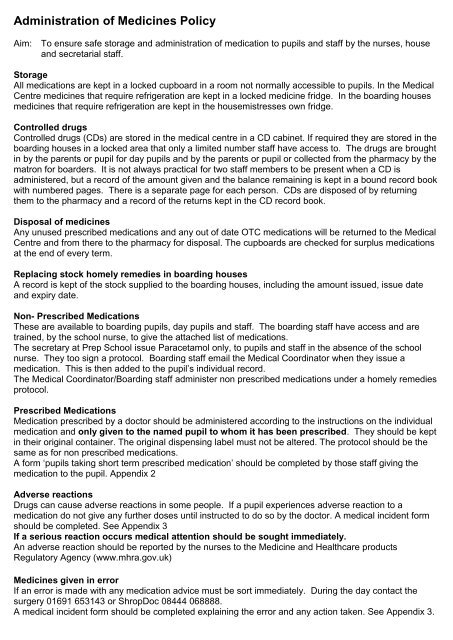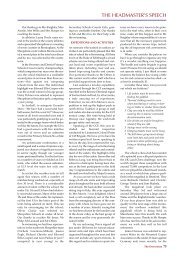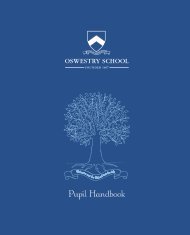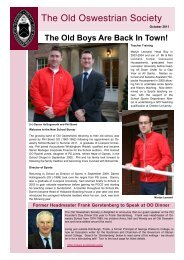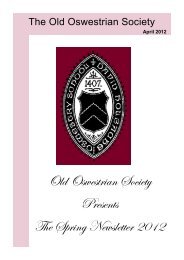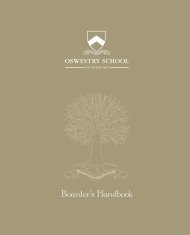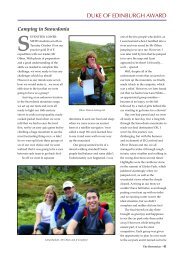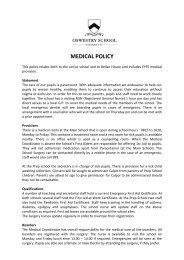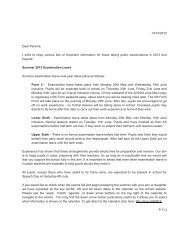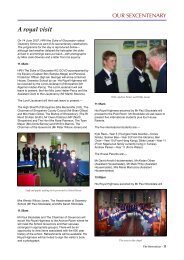Administration of Medicines Policy - Oswestry School
Administration of Medicines Policy - Oswestry School
Administration of Medicines Policy - Oswestry School
You also want an ePaper? Increase the reach of your titles
YUMPU automatically turns print PDFs into web optimized ePapers that Google loves.
<strong>Administration</strong> <strong>of</strong> <strong>Medicines</strong> <strong>Policy</strong><br />
Aim: To ensure safe storage and administration <strong>of</strong> medication to pupils and staff by the nurses, house<br />
and secretarial staff.<br />
Storage<br />
All medications are kept in a locked cupboard in a room not normally accessible to pupils. In the Medical<br />
Centre medicines that require refrigeration are kept in a locked medicine fridge. In the boarding houses<br />
medicines that require refrigeration are kept in the housemistresses own fridge.<br />
Controlled drugs<br />
Controlled drugs (CDs) are stored in the medical centre in a CD cabinet. If required they are stored in the<br />
boarding houses in a locked area that only a limited number staff have access to. The drugs are brought<br />
in by the parents or pupil for day pupils and by the parents or pupil or collected from the pharmacy by the<br />
matron for boarders. It is not always practical for two staff members to be present when a CD is<br />
administered, but a record <strong>of</strong> the amount given and the balance remaining is kept in a bound record book<br />
with numbered pages. There is a separate page for each person. CDs are disposed <strong>of</strong> by returning<br />
them to the pharmacy and a record <strong>of</strong> the returns kept in the CD record book.<br />
Disposal <strong>of</strong> medicines<br />
Any unused prescribed medications and any out <strong>of</strong> date OTC medications will be returned to the Medical<br />
Centre and from there to the pharmacy for disposal. The cupboards are checked for surplus medications<br />
at the end <strong>of</strong> every term.<br />
Replacing stock homely remedies in boarding houses<br />
A record is kept <strong>of</strong> the stock supplied to the boarding houses, including the amount issued, issue date<br />
and expiry date.<br />
Non- Prescribed Medications<br />
These are available to boarding pupils, day pupils and staff. The boarding staff have access and are<br />
trained, by the school nurse, to give the attached list <strong>of</strong> medications.<br />
The secretary at Prep <strong>School</strong> issue Paracetamol only, to pupils and staff in the absence <strong>of</strong> the school<br />
nurse. They too sign a protocol. Boarding staff email the Medical Coordinator when they issue a<br />
medication. This is then added to the pupil’s individual record.<br />
The Medical Coordinator/Boarding staff administer non prescribed medications under a homely remedies<br />
protocol.<br />
Prescribed Medications<br />
Medication prescribed by a doctor should be administered according to the instructions on the individual<br />
medication and only given to the named pupil to whom it has been prescribed. They should be kept<br />
in their original container. The original dispensing label must not be altered. The protocol should be the<br />
same as for non prescribed medications.<br />
A form ‘pupils taking short term prescribed medication’ should be completed by those staff giving the<br />
medication to the pupil. Appendix 2<br />
Adverse reactions<br />
Drugs can cause adverse reactions in some people. If a pupil experiences adverse reaction to a<br />
medication do not give any further doses until instructed to do so by the doctor. A medical incident form<br />
should be completed. See Appendix 3<br />
If a serious reaction occurs medical attention should be sought immediately.<br />
An adverse reaction should be reported by the nurses to the Medicine and Healthcare products<br />
Regulatory Agency (www.mhra.gov.uk)<br />
<strong>Medicines</strong> given in error<br />
If an error is made with any medication advice must be sort immediately. During the day contact the<br />
surgery 01691 653143 or ShropDoc 08444 068888.<br />
A medical incident form should be completed explaining the error and any action taken. See Appendix 3.
Medication brought into school by the pupils<br />
There are risks that prescribed medications will interact with medications purchased over the counter and<br />
cause harm. Or that herbal or traditional medications could interact with prescribed or over the counter<br />
medications. Over the counter medication should never be given to a pupil who has taken their<br />
own medicine.<br />
A record will be kept <strong>of</strong> any medications that the pupils bring into school. It is the schools policy that the<br />
pupils do not bring in their own medications unless they are prescribed, but some always will.<br />
Self administration <strong>of</strong> medications<br />
Boarders assessed as being able to self medicate sign the appropriate form. See Appendix 4. The pupil<br />
should be aware that they must keep their medicines in a secure place, and not give their medication to<br />
anyone else, even if they have the same symptoms.<br />
The school has a protocol for assessing the ability <strong>of</strong> the pupils to self administer their medications. See<br />
attached – Appendix 5.<br />
<strong>Administration</strong> to save a life<br />
In extreme emergencies e.g. an anaphylactic reaction, certain medicines can be given or supplied<br />
without the direction <strong>of</strong> a doctor, or without there being a patient group directive PGD, for the purpose <strong>of</strong><br />
saving life. In an extreme emergency a medication e.g. adrenalin would be given. (Article 7 <strong>of</strong> the<br />
Prescription Only <strong>Medicines</strong> (Human Use) Order 1997).<br />
Recording<br />
Medications are recorded to provide a complete audit trail for all medications. Signatures are kept <strong>of</strong><br />
every person who administers medication. The records are checked frequently by the school nurses.<br />
The Headmaster is aware <strong>of</strong> the methods used to keep records, but does not review the records himself.<br />
In Boarding Houses, the records are recorded in a book, and copied onto the pupils’ personal file on a<br />
week day basis. This makes it possible to follow an audit trail for the treatment. E.g. where a boarder is<br />
issued Paracetamol in the boarding house by a matron and then later in the medical centre by the nurse,<br />
both entries are recorded in the one place. When a boarder is given medication by the nurses after<br />
midday the boarding houses are notified.<br />
Mrs E Nunnerley<br />
Medical Coordinator<br />
Reviewed: Jan 2012<br />
Review Date: Jan 2013
<strong>Administration</strong> <strong>of</strong> Over the Counter Medication<br />
Protocol<br />
Appendix 1<br />
The medications kept in locked cupboards in the boarding houses are as follows:-<br />
Medication<br />
Paracetamol 500mg<br />
Calpol 6 plus<br />
Ibupr<strong>of</strong>en BP 200mg<br />
Savlon<br />
Burnease<br />
Optrex<br />
Olbas oil<br />
Eurax cream<br />
Deep Heat<br />
Piriton<br />
Arnica cream<br />
Stugeron 15<br />
E45 or generic versions<br />
Reason for administration<br />
- Headaches, period pains, pyrexia, toothache, migraine, muscular aches<br />
and pains, neuralgia, colds, sore throats and flu.<br />
- as above for under 12 year olds.<br />
- NOT TO BE ISSUED TO ASTHMATICS. (Unless prescribed.) Not to be<br />
given to under 12s<br />
Headaches, muscular pain and backache, dental pain, period pain, neuralgia.<br />
- Antiseptic spray for minor wounds<br />
- for minor unbroken burns<br />
- for tired eyes<br />
- for nasal congestion<br />
- itchy skin, insect bites and stings<br />
- muscular pains<br />
- antihistamine for hay fever<br />
- bruise relief<br />
- travel sickness<br />
- dry skin<br />
Procedure<br />
When issuing a medication the following procedure should be followed:-<br />
The reason for giving the medication should be established.<br />
The contraindications <strong>of</strong> giving the medication should be known or checked.<br />
Whether the student has taken any medication recently, and if so what. (Paracetamol should not be<br />
issued more frequently than every four hours).<br />
Whether the student has taken the medication before, if not, whether the student is allergic to any<br />
medication.<br />
The medication is in date.<br />
The student should be seen to take the medication by the person issuing it.<br />
The student’s name, the reason for the medication, the medication issued, the dosage, the date and<br />
the time should be noted immediately in the relevant medical record book.<br />
This protocol has been agreed by the school medical coordinator<br />
Staff administering medication<br />
Name<br />
Signature sample<br />
Trained by<br />
Initial sample<br />
Date
Prescription Medicine <strong>Administration</strong> Record Chart<br />
Name <strong>of</strong> Pupil :- …………………………………………………..<br />
Drug & Strength :-…………………………………………………<br />
Dosage :- ……………………………………………………………<br />
Reasons for giving :- ………………………………………………<br />
D.O.B :- …………………………..<br />
Quantity :- …………………………<br />
Date received :- ……………………<br />
Allergies :- …………………………<br />
WEEK ONE<br />
WEEK TWO<br />
DATE TIME INITIAL DATE TIME INITIAL<br />
Date course finished …………………………………..<br />
Date unused medication returned…………………….Quantity returned ………………………<br />
To where returned ………………………………………………………………………………………<br />
Name <strong>of</strong> person returning medication ………………………………………………………………..<br />
Additional Notes:-
Medical Incident Form<br />
Appendix 3<br />
This form is to be used when a medication has been given in error or when a pupil has had an adverse<br />
reaction to a medication.<br />
Pupils Name<br />
Date<br />
Medication given<br />
Explanation <strong>of</strong> the incident<br />
Action taken<br />
Outcome<br />
Follow up
<strong>Oswestry</strong> <strong>School</strong><br />
Appendix 4<br />
PUPILS WHO ADMINISTER THEIR OWN PRESCRIBED MEDICATIONS<br />
Name <strong>of</strong> pupil: _______________________________________<br />
Name <strong>of</strong> medication/dose: ____________________________________<br />
Amount <strong>of</strong> medication given to the pupil: __________________________<br />
How <strong>of</strong>ten taken: ___________________________________________<br />
Medication can be stored in pupil’s own locked area.<br />
Age <strong>of</strong> pupil<br />
YES/NO<br />
___ years<br />
Length <strong>of</strong> treatment<br />
Pupil’s choice<br />
Date____________to___________<br />
YES/NO<br />
Pupil has proven themselves to be reliable<br />
Full understanding <strong>of</strong> reasons for medication<br />
and side effects<br />
Knows when and how to take medicine<br />
YES/NO<br />
YES/NO<br />
YES/NO<br />
Important: If a pupil is not keeping medication locked away the right to self medication will be removed.<br />
Pupil signature: ________________________ Date ________________<br />
Staff signature: ________________________ Date _________________
Appendix 5<br />
ADMINISTRATION OF OWN MEDICATION PROTOCOL<br />
The school allows pupils to keep their own medications in a locked area in the boarding house if they<br />
have been assessed as competent to do so. Asthmatics may carry their inhalers with them.<br />
The criteria used to assess the pupils are:<br />
<br />
<br />
<br />
<br />
<br />
<br />
<br />
<br />
The age <strong>of</strong> the pupil<br />
Whether the medication is long term or a short course<br />
The pupils own choice<br />
Whether the pupil has proven himself or herself to be reliable in general and will<br />
remember to take the medication if it is to be taken regularly.<br />
That the pupil understands why they are taking the medication and any<br />
side effects, and the risks <strong>of</strong> overdose.<br />
That the pupil knows when and how to take the medication.<br />
That the pupil can effectively store the medication in a locked area.<br />
That the pupil understands that they should never give the medicine to anyone else, even if they have<br />
similar symptoms.


